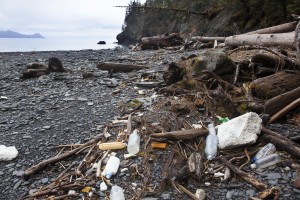
A barge that picked up marine debris along coastlines in Alaska and British Columbia this summer has delivered its cargo to Seattle, but organizers are waiting for a permit to go through before they can move the debris into storage and sort it.
Chris Pallister is the president of Gulf of Alaska Keeper, a nonprofit involved in tsunami debris cleanup and one of the main organizations behind the removal, and he says they’re working with a group called Parley for the Oceans, which focuses on the sustainability of the world’s seas.
“Parley for the Oceans wants to sort it all and then recycle a lot of it and use a lot of it themselves in some of the proprietary processes they have for spinning yarn and things like that,” Pallister said. “They make designer clothing out of it. Any plastic that they can use in their process. I think they’re gonna take all the nets and lines and then they get it all and run it through their process and come up with a fiber at the end of it.”
They can do that once they’re able to go through the debris.
Pallister says Waste Management applied for a permit to accept the debris into its new yard about two weeks ago, but he says the requirement came as a surprise.
“I think that even waste management didn’t realize we’d need a permit and none of us did, of course, and if we knew this, we would have applied,” he said. “We would have applied last spring, actually, is when we would have done this, just like when we applied for all our land access permits.”
He says he doesn’t know when they will get that permit or how long it usually takes.
“Waste Management’s doing their very best to get it sorted out, and they really, truly want to recycle this stuff, so they’re going to the extra mile to make it happen and they’re providing their yard free of charge and the rest of it, and Parley’s putting money into building containment facilities and things like that, so everybody’s trying really hard to get this done,” he said.
Pallister says this is the first time they’ve gone through this process, and there are bound to be some mistakes along the way. He also says there’s a lot they can learn and improve upon for the next time around.
Kayla Deroches is a reporter at KMXT in Kodiak.




